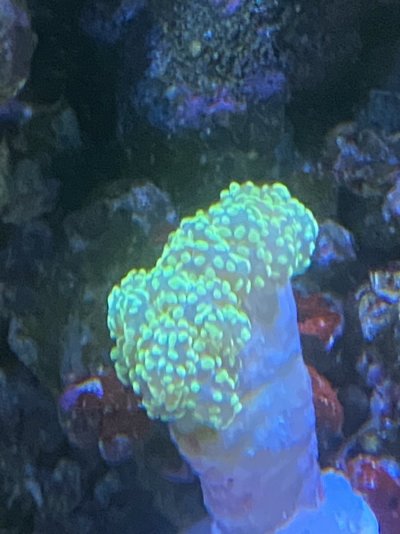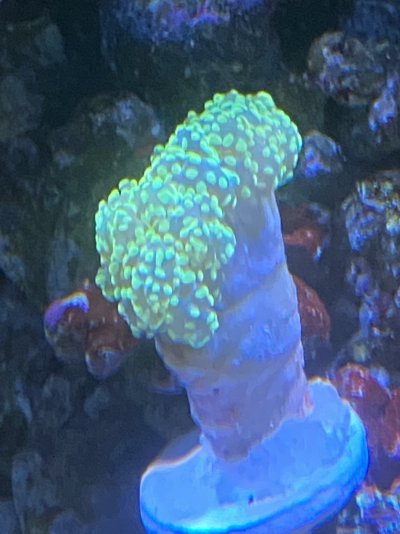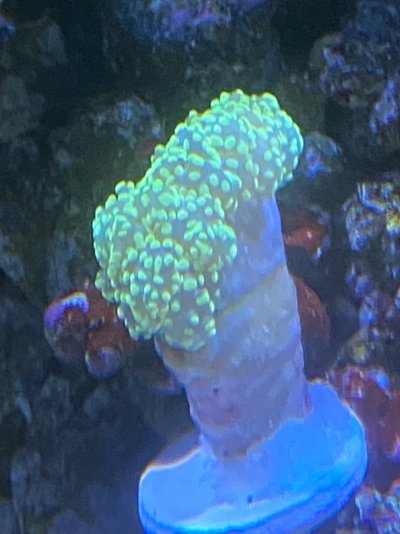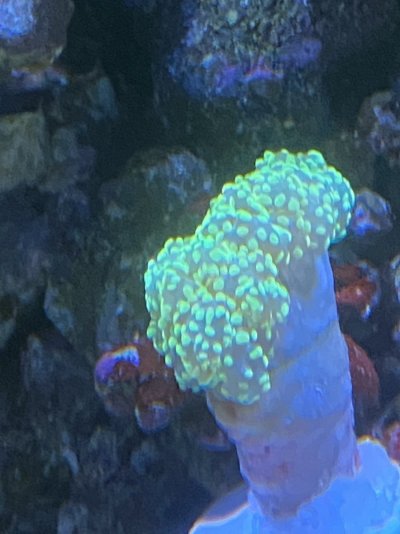Navigation
Install the app
How to install the app on iOS
Follow along with the video below to see how to install our site as a web app on your home screen.
Note: This feature may not be available in some browsers.
More options
You are using an out of date browser. It may not display this or other websites correctly.
You should upgrade or use an alternative browser.
You should upgrade or use an alternative browser.
ID Help. Thank you!
- Thread starter Jbyrd71
- Start date
- Tagged users None
Frogspawn/octospawn.
That is a frogspoawn, which is actually an LPS coral, not a soft coral.
It’s hard to tell right now because it’s either too small or not fully extended but if I had to take a guess, it’s an octospawn
Thank you. I am not aware of the differenceThat is a frogspoawn, which is actually an LPS coral, not a soft coral.
SPS

sps coral photo via reef2reef member @gws3
Small Polyp Stony corals, or SPS, are the most demanding as far as quality of light and water. These corals consume high levels of Calcium and the Alkalinity will also need constant upkeep. These corals often require more stable water and will need more attention to parameters. Adding Kalkwasser to your topoff water can be a great way to keep these corals growing. Some SPS include Acropora, Montipora, and Hydnophora. These are constructed of a calcium based skeleton with a flesh that coveres them. The pours on the skeleton have tiny polyps that come out and feed from the water column. Each polyp is an individual animal, though connected by a similar flesh and structure.
LPS

Acanthophyllia Deshayesiana (meat coral) image via reef2reef member @Fishinfool
Large Polyp Stony corals are less demanding. They do well in medium to lower lighting and medium flow. These also have a calcified skeleton, but the polyps are much larger. Chalice coral, Brain corals, Duncan corals, Candy Canes, and Acans are just a few. These are more hands on. You can actually feed the mouths of each polyp and it will eat like a venus fly trap, some large enough to eat entire krill in one gulp! These also require a source of calcium. The water quality can be a little less attended, but they will thrive in clean, stable water.
Softies

toadstool leather (center) image via reef2reef member @donfishy
These are generally the easiest corals. Kenya tree, mushrooms, Zoas, Xenia, Star polyps. Anything that does not have a skeleton falls in this category. They can live in low light and low flow for the most part. Some softies can live in any level of lighting, and some grow Too fast. These are the easiest to grow, but so are dandelions. Weeds are not only in your yard. Some corals can take off in your tank to the point of insanity. Make sure you research ways to maintain plague corals or you could have your own unintentional Pulsing Xenia farm.
NPS

sun coral image via reef2reef member @Dixie_reefer
Non-Photosynthetic corals are the hardest to keep. They require constant food and superb water quality. They are best kept for the professional as they require very unique methods of upkeep. These corals are known to rapidly deteriorate, if you do attempt one you must research its needs and be ready to remove it if it starts to rot. Sun coral, Gorgonians, and Sponges are a few examples of NPS corals.
After quarantine you will be ready to start adding the corals to your tank. For the first week or two they will be loose, and need a close watch. Critters can knock them over or even take them. Every coral you get is best started on the sand bed and worked towards the spot you want them in over the course of a couple weeks to acclimate them to the lighting and flow. When you have them in the spot they shall reside you can use Super Glue Gel or Reef Putty to bond the corals to the rock. Take the coral out of the water and put a large glob of glue on the rock or plug it is attached to and stick it in place under water. In a few minutes the glue will be completely dry. By the time the superglue comes apart the coral will have already grown onto the rock. There are many other ways to bond corals so check around for how others have done theirs if you have something that you are having trouble attaching to something.
sps coral photo via reef2reef member @gws3
Small Polyp Stony corals, or SPS, are the most demanding as far as quality of light and water. These corals consume high levels of Calcium and the Alkalinity will also need constant upkeep. These corals often require more stable water and will need more attention to parameters. Adding Kalkwasser to your topoff water can be a great way to keep these corals growing. Some SPS include Acropora, Montipora, and Hydnophora. These are constructed of a calcium based skeleton with a flesh that coveres them. The pours on the skeleton have tiny polyps that come out and feed from the water column. Each polyp is an individual animal, though connected by a similar flesh and structure.
LPS
Acanthophyllia Deshayesiana (meat coral) image via reef2reef member @Fishinfool
Large Polyp Stony corals are less demanding. They do well in medium to lower lighting and medium flow. These also have a calcified skeleton, but the polyps are much larger. Chalice coral, Brain corals, Duncan corals, Candy Canes, and Acans are just a few. These are more hands on. You can actually feed the mouths of each polyp and it will eat like a venus fly trap, some large enough to eat entire krill in one gulp! These also require a source of calcium. The water quality can be a little less attended, but they will thrive in clean, stable water.
Softies
toadstool leather (center) image via reef2reef member @donfishy
These are generally the easiest corals. Kenya tree, mushrooms, Zoas, Xenia, Star polyps. Anything that does not have a skeleton falls in this category. They can live in low light and low flow for the most part. Some softies can live in any level of lighting, and some grow Too fast. These are the easiest to grow, but so are dandelions. Weeds are not only in your yard. Some corals can take off in your tank to the point of insanity. Make sure you research ways to maintain plague corals or you could have your own unintentional Pulsing Xenia farm.
NPS
sun coral image via reef2reef member @Dixie_reefer
Non-Photosynthetic corals are the hardest to keep. They require constant food and superb water quality. They are best kept for the professional as they require very unique methods of upkeep. These corals are known to rapidly deteriorate, if you do attempt one you must research its needs and be ready to remove it if it starts to rot. Sun coral, Gorgonians, and Sponges are a few examples of NPS corals.
After quarantine you will be ready to start adding the corals to your tank. For the first week or two they will be loose, and need a close watch. Critters can knock them over or even take them. Every coral you get is best started on the sand bed and worked towards the spot you want them in over the course of a couple weeks to acclimate them to the lighting and flow. When you have them in the spot they shall reside you can use Super Glue Gel or Reef Putty to bond the corals to the rock. Take the coral out of the water and put a large glob of glue on the rock or plug it is attached to and stick it in place under water. In a few minutes the glue will be completely dry. By the time the superglue comes apart the coral will have already grown onto the rock. There are many other ways to bond corals so check around for how others have done theirs if you have something that you are having trouble attaching to something.
Similar threads
- Replies
- 7
- Views
- 285
- Replies
- 18
- Views
- 180



















